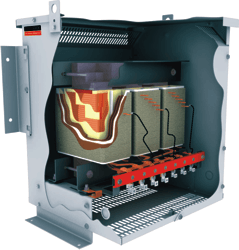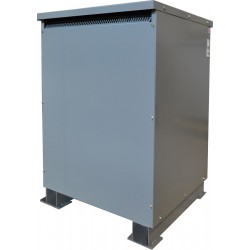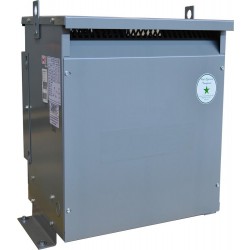Isolation Transformers

Isolation / Distribution Transformers have primary and secondary windings are physically separated from each other. The windings of isolation transformer are insulated from each other and are referred to as "insulated". In an isolation transformer the output winding will be isolated. Secondary neutral to ground bonding eliminates common mode noise, providing an isolated neutral-ground reference for sensitive equipment.
An isolation transformer allows an AC signal or power to be taken from one device and fed into another without electrically connecting the two circuits. Isolation transformers block transmission of DC signals from one circuit to the other, but allow AC signals to pass. They also block interference caused by ground loops. Isolation transformers are different from autotransformers in which the primary and secondary share a common winding. Isolation transformers are often used to protect high gain circuits, or prevent noisy ground paths in instrumentation.
Copper and aluminum are used for transformer windings. These materials are available in a variety of grades and thickness, each with their own efficiency characteristic. Winding losses, or load losses, arise from the conducting material's inherent resistance to the flow of electrical current. Winding losses increase with the square of the transformer load. Efficiency gains can be achieved by using materials with lower resistivity or greater diameter. For example, coils made with copper can have considerably lower load losses than those make with other materials. Data based on popular 45 kVA size shows $1000/ year savings.
-
Enclosure E3R-6-W
Currently 0 units in Stock. Ship next business day.US$ 370.00Catalog No.: E3R-6-W
See Full Specification | Add to Compare
-
10 kVA 480 Volt to 240/480 Volt Single phase Isolation Transformer SC10H-L
NOT in stock. Current lead time to manufacture: 2-3 weeksUS$ 2,181.00Catalog No.: SC10H-L
See Full Specification | Add to Compare
Isolation Transformer 10 kVA • Single Phase • Primary: 480 Volt • Secondary: 240/480 Volt
Conductor: Copper. • Frequency 60 Hz. -
10 kVA 120/240 Volt to 240/480 Volt Single phase Isolation Transformer SC10K-L
NOT in stock. Current lead time to manufacture: 2-3 weeksUS$ 2,826.00Catalog No.: SC10K-L
See Full Specification | Add to Compare
Isolation Transformer 10 kVA • Single Phase • Primary: 120/240 Volt • Secondary: 240/480 Volt
Conductor: Copper. • Frequency 60 Hz. -
10 kVA 480 Volt to 220/440 Volt Single phase Isolation Transformer SC10H-L2
NOT in stock. Current lead time to manufacture: 2-3 weeksUS$ 2,086.00Catalog No.: SC10H-L2
See Full Specification | Add to Compare
Isolation Transformer 10 kVA • Single Phase • Primary: 480 Volt • Secondary: 220/440 Volt
Conductor: Copper. • Frequency 60 Hz. -
10 kVA 600 Volt to 220/440 Volt Single phase Isolation Transformer SC10J-L2
NOT in stock. Current lead time to manufacture: 2-3 weeksUS$ 2,153.00Catalog No.: SC10J-L2
See Full Specification | Add to Compare
Isolation Transformer 10 kVA • Single Phase • Primary: 600 Volt • Secondary: 220/440 Volt
Conductor: Copper. • Frequency 60 Hz. -
10 kVA 600 Volt to 240/480 Volt Single phase Isolation Transformer SC10J-L
NOT in stock. Current lead time to manufacture: 2-3 weeksUS$ 1,829.00Catalog No.: SC10J-L
See Full Specification | Add to Compare
Isolation Transformer 10 kVA • Single Phase • Primary: 600 Volt • Secondary: 240/480 Volt
Conductor: Copper. • Frequency 60 Hz.

 United States
United States



